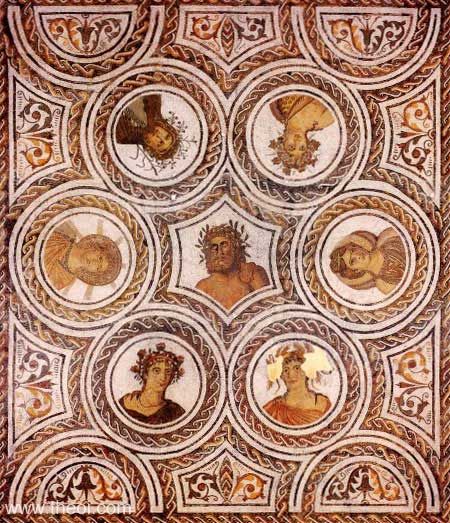
The ancient Greeks used mythology to help describe and explain the world around them, including the strange and interesting ways nature and the climate changed throughout the year. Originally used to represent the changes in the natural world each year, the Horae were a group of goddesses who represented the seasons. The goddesses were sometimes also known as the Hours, but Horae is actually related to the word year.

In their earliest use in Greek mythology, the Horae embodied nature and its various characteristics and changes throughout the year. This change of the seasons throughout a year was known as the dance of the Horae. Over time, the Horae came to represent more generally, order and natural justice. Additionally, the goddesses were known to guard the gates to Olympus and represented fertility.
Horae 6 Piece 7 Seat Conversation Set
8 The attributes of spring-flowers, fragrance, and graceful freshness are accordingly transferred to the Horae; thus they adorned Aphrodite as she rose from the sea, made a garland of flowers for Pandora, and even inanimate things are described as deriving peculiar charms from the Horae. 9 Hence they bear a resemblance to and are mentioned.
In Greek mythology there were two different sets of Horae. In both stories, the goddesses were the daughters of Zeus. The original Horae, linked to the changing of the seasons, were Zeus’s daughters with Aphrodite. Aphrodite was the goddess of love and fertility. While in today’s world we have four seasons, the ancient Greeks only recognized three. These first three Horae were Thallo, goddess of springtime and blooming flowers, Auxo, goddess of summer and the increaser of plant growth, and Carpo, the goddess of autumn and the harvest.


These Horae stood for several additional and related qualities, secondary to their primary duties. Thallo was also the protector of youth and innocence. Auxo encouraged growth and fertility among the Greeks. Carpo, most importantly, was the primary guardian of the road to Olympus. She would cover the pathway with clouds, only revealing the road for the gods of Olympus.
As the Horae evolved over time, changing from the goddesses of seasons to the goddesses of order, their origins were linked to a different mother, Themis. Themis, herself one of the Titan goddesses, married the Olympian god Zeus after he conquered the Titans, at last bringing order to this battle between the Titans and Olympians. Netgear wifi driver downloadeverfoundry. Themis, like her daughters the Horae, was, because of her marriage to Zeus, associated with law and order. These three daughters of Zeus and Themis were Dike, Eunomia, and Eirene. Word of the day. Download free burial south london boroughs ep rar download.
Horaechem
Dike personified moral justice. Unlike her mother, who represented the justice of the gods, Dike represented human justice and laws, and was seen holding a scale that she kept in balance. Eunomia represented legislation and good human laws. The third of these Horae, Eirene, stood for peace and wealth. Eirene carried with her a torch, scepter, and a cornucopia. A cornucopia is a horn-shaped basket overflowing with food and flowers, representing the wealth and abundance that Eirene personified.
- The Horae or Hours were the goddesses of the seasons in Greek mythology. They were also considered to be the goddesses of order and justice, as well as the wardens at the gates of Mount Olympus. They were the daughters of either Zeus and Aphrodite, or Zeus and Themis. Two groups of Horae are mentioned in the Greek myths.
- Horae (plural; singular Hora) (Greek mythology) The goddesses of the seasons and the natural portions of the times of the year, and the laws and orders of time; originally the personifications of nature in its different seasonal aspects, but in later times regarded as goddesses of order in general and of natural justice.
Horae Latin
Link/cite this page
If you use any of the content on this page in your own work, please use the code below to cite this page as the source of the content.

Horae Timecode

Link will appear as Horae: https://greekgodsandgoddesses.net - Greek Gods & Goddesses, June 10, 2018
